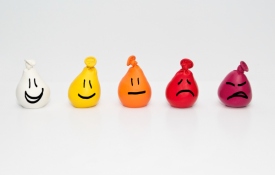-

Misleading Feedback Could Make Psychological Symptoms Worse
The ambiguous nature of many psychological symptoms makes them particularly sensitive to misinformation.
-
First Annual Elizabeth Capaldi Phillips Lecture Held at University of Florida
The first annual Elizabeth Capaldi Phillips Lecture was presented December 10, 2019 by psychological scientist Dana Small (Yale University) at the University of Florida’s McKnight Brain Institute. APS Past President Elizabeth Capaldi Phillips – who served as provost of the University of Florida from 1996 to 1999, and provost and executive vice president of the Arizona State University from 2006 to 2013 – was widely recognized for her work on how motivation and learning influence eating behavior before her death in 2017.
-
Five APS Fellows Elected to Society of Experimental Psychologists
A Guggenheim Fellow and a co-founder of a widely influential psychological theory are among four APS Fellows newly elected to the Society of Experimental Psychologists (SEP), the oldest and one of the most prestigious honorary societies in scientific psychology. APS Fellows Diane Beck, Charles Brainerd, Steve Sloman, Joshua Greene, and Fei Xu, along with three other psychological scientists, have been selected as 2020 SEP Fellows. In addition, Vanderbilt University researcher Jennifer Trueblood, named an APS Rising Star in 2015 and a 2020 APS Janet Taylor Spence Award recipient, is receiving the SEP Early Investigator Award.
-

For Narcissists, Social Status Overshadows All
Humans are fundamentally motivated to boost their social status, but narcissistic individuals are driven to climb the social ladder at all costs.
-

Interracial Contact During Medical School Predicts Less Racial Bias
Interracial contact with other practitioners during medical school may help reduce physicians’ racial bias, improving treatment outcomes for patients.
-
Robert Plomin Receives Grawemeyer Award for Behavioral Genetics Research
Robert Plomin APS Past Board Member and William James Fellow Robert Plomin of King’s College London has received the 2020 University of Louisville Grawemeyer Award for Psychology for his research on how DNA shapes personality. Plomin’s theory on the “nature of nurture” brings together genetic and environmental perspectives on the psychological science of individual behavioral differences, even between siblings raised in the same household. “Genes make us who we are by influencing how we interact with the world around us, driving the way we select, modify, and even create our environment,” Plomin said in a statement for the award announcement.

